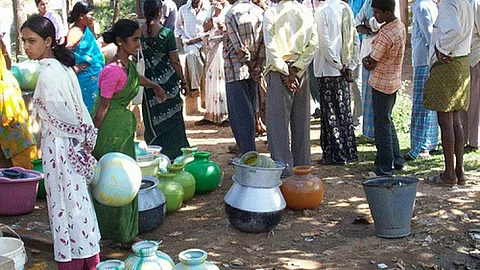
- Topics
- Feature
- Opportunities & Events
- Data
- Hindi Portal
- Topics
- Feature
- Opportunities & Events
- Data
- Hindi Portal

In response to a plea filed by Association of the Industrial Manufactures, the National Green Tribunal has said that the availability of drinking water is the first priority and it is for industries and authorities concerned to find out alternative ways for their sustenance instead of permitting indiscriminate withdrawal of groundwater. The Association has sought impleadment in a petition filed against industrial units running without the requisite statutory consent. The tribunal has suggested that industries should shift to areas where water is not scarce or to processes which do not require water, as an alternative, instead of withdrawing groundwater in over exploited, critically exploited and semi-critical exploited (OCS) areas. (Money Control)
The Supreme Court has put a stay on felling of trees in Mumbai's Aarey colony, however, there is no stay on the construction of the Mumbai Metro car shed. Along with this, the apex court asked the Brihanmumbai Municipal Corporation (BMC) to submit a report on the number of trees cut, afforestation and transplantation being carried out in lieu of felling of trees at Mumbai's prominent green lung. The project proponent has assured the Court that absolute status quo is being maintained with regard to felling of trees in the area and also rubbished the allegation that a colony is being constructed in the forest area. (The Economic Times)
Dissatisfied over the report filed by the Centre on checking wastage of water, the National Green Tribunal has stated that apart from writing letters to states, the Centre should make specific time-bound action plan along with monitoring and taking coercive steps. The tribunal was hearing a plea filed by a councillor in Ghaziabad and an NGO alleging that proper steps are not being taken to prevent misuse of water. As per the Tribunal, although both Jal Shakti ministry and Delhi Jal Board filed their responses but none of the reports show clear enforceable policy to check misuse and wastage of water. The NGT has now ordered both the Centre and DJB to plan appropriate measures for checking the water wastage and file action taken by e-mail before December 12. (The Times of India)
Taking note of the looming water crisis in the country, the Central Board of Secondary Education (CBSE) has made it mandatory for the schools to become water-efficient within the next three years by adopting a policy of water management and conducting regular water audits. As per the water conservation guidelines drafted by the board, all its affiliated school will have to replace old fixtures and appliances with water-efficient models, installing automatic taps with sensors and double flush tanks on priority, ensuring regular check-ups for leakages and their prompt fixing. Also, CBSE has asked schools to constitute school water management committee that would be responsible for efficient use of water in the school. (The Indian Express)
Concerned towards the waterlogging in parts of the capital for over a fortnight now and reports of people suffering from dengue, the Patna High Court has ordered the Bihar government to take urgent steps. The court has directed the state government along with municipal corporation to drain water out of areas that are still inundated and take steps to prevent the spreading of dengue on a war-footing. Along with this, taking note of frequent complaints of helplines set up by the authorities being unresponsive, the court has ordered the state government as well as the civic body to show sensitivity by receiving phone calls and giving proper replies. (Hindustan Times)
This is a roundup of important policy matters from October 16 - 22, 2019. Also, read news this week.